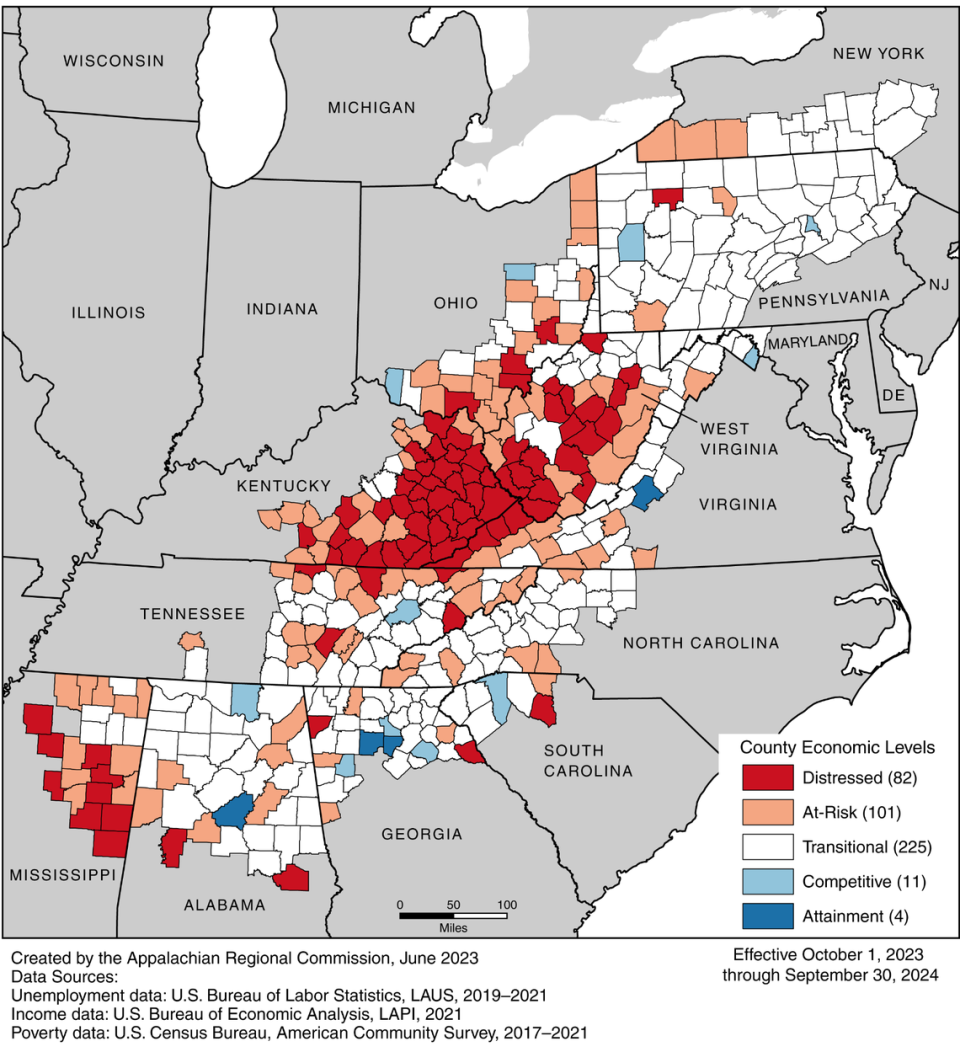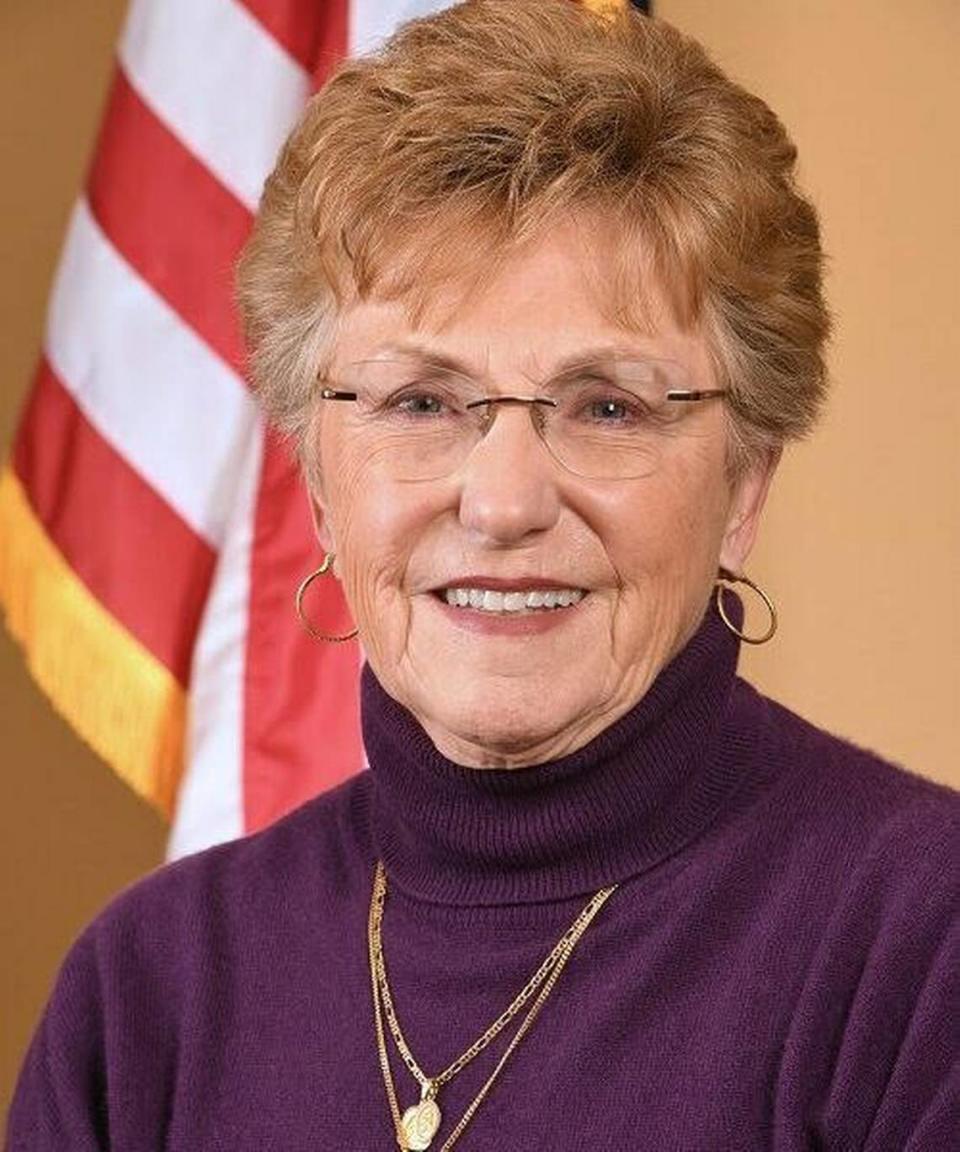‘Very unique moment.’ Head of Appalachian development agency discusses hopes for region
Gayle Manchin is the federal co-chair of the Appalachian Regional Commission, set up to try to improve the economy in a region covering all of West Virginia and parts of 12 other states, including Eastern Kentucky.
Manchin discussed some thoughts on the region with the Herald-Leader. Her responses have been edited for clarity.
Q: ARC analyzes unemployment rates, income and poverty rates to classify the economic status of 423 counties in the federally-designated Appalachian region and compare them to the rest of the U.S. Counties in the bottom 10% nationally are considered “distressed.”
In the current fiscal year, 82 Appalachian counties were classified as distressed. The largest cluster by far, 36 counties, was in Eastern Kentucky.
What explains that?
Manchin: “It’s interesting, when I became the federal co-chair that was the first thing I noticed, was what I call the big red blob right in the middle of the Appalachian region.
So I think several factors have influenced that.
The biggest one is that that is the most rugged part of the Appalachian mountain ridge through that area. So everything is more difficult — building roads, building homes, attracting business.
And of course the heart and soul of that region has always been coal, and providing the energy that certainly kept the lights on in this country, but unfortunately, the money that came from the coal was never invested back into the communities of Central Appalachia. The money went out of state and to big coal companies.
Certainly the area was rich in the energy that was contained in those mountains, but it did not benefit the people or the communities within that area.”

Q: Work to diversify the economy in Eastern Kentucky has taken on an increased urgency since coal jobs went down rapidly beginning in 2012. What needs to be done to make further improvements?
Manchin: “As you know this didn’t happen overnight (the economic problems), it’s not gonna be corrected overnight, but I think we are doing things that are going to have a great impact over the next few years.
Healthcare has become a big industry in Eastern Kentucky.
Certainly improvement of highways through the area, and of course now the newest highway, the broadband highway, is critically important, particularly in the healthcare arena because it provides the opportunity to use telehealth more efficiently.
I think the other arena that is showing great promise are educational and academic programs, our training centers, our community colleges.
Our young people that are growing up in Eastern Kentucky now know that you don’t have to have a four-year degree to have a great job in Eastern Kentucky. They have the training centers now with training in these programs which can provide good quality jobs where people can have a good quality of life.”
Manchin said tourism also creates economic opportunities, mentioning developing projects such as Boone’s Ridge in Bell County, which will feature wildlife viewing, an aerial gondola, a zoo, hiking trails and other attractions.
Tourism “will be a great boost to building the economies of these small counties,” she said.
“It’s not gonna happen overnight, but I think we’re on a pathway of opening possibilities where not only are you going to retain people that live there now, they won’t have to leave to find a job. Children won’t have to leave to get a career. You’re also . . . gonna be recruiting more people to come in and live in the area,” she said.

“I think finally we have begun to realize how much more we can do if we work collectively than if we work by ourselves individually and in isolation. I think that will just continue to grow as well, that collaboration, people sharing information, not only across communities and programs, but across state lines. We can do the bigger projects because we’re actually doing things to affect the region,” Manchin said.
Q: Eastern Kentucky has been losing population for decades. Is there a concern about being able to create enough jobs quickly enough to stop or reverse the losses?
Manchin: “I think that’s already happening. I think with the growth of our medical centers, with these resorts being built, I think . . . now it’s almost like the opposite — do we have enough people to fill the jobs? And I think with the training and the people, I think we’re gonna reach a good balance there.”
Things may be moving slowly, “but the momentum is growing, the opportunities are growing,” Manchin said
Manchin said it is healthy that the region is no longer banking primarily on a single industry.
She also mentioned the Biden Administration pushed for measures including the Bipartisan Infrastructure Act and the Inflation Reduction Act that created much more funding that could be used for projects in Appalachia.
“It is a very unique moment. We’ve never had it before and we may never have it again and so all the more reason to take advantage of it right now. The urgency of doing as much as we can while these resources is available is critical,” Manchin said.
Q: What do you hope can be accomplished in the region over the next 10 to 15 years?
Manchin: “I would hope that we would see a thriving tourism economy through the Appalachian region, where people are really being able to enjoy the culture, the heritage, the beauty of our land and certainly the most important, the beauty of our people, and how gracious and hospitable they are.
I think the spirit of young people, that entrepreneurship, would also thrive in this area because of what you’re attracting these young people to.
So I would hope to see an economy that finally the Appalachian region does have parity with the rest of the country, and I would say even better than that, the Appalachian region reaches a point where it’s competing with the rest of the country and globally.
I’m very optimistic because of what’s happening right now. I think that this is the catalyst for what’s possible. Anytime you’re trying to make improvements and move forward, it feels slow, but I think when we look back in a few years we’re going to be amazed at the difference that we’re going to see. I think you’re going to see a lot more hope, sense of purpose, success, growth, families staying, families coming in.”
Q: There have been efforts in the past to slash funding for the ARC, most recently under the Trump Administration, though the agency has received record appropriations since then. Do you think it will survive?
Manchin said she hoped that someday the commission would no longer be needed because of economic improvements in the region, but it needs to stay in place for now.
“I hope that there will be enough common sense in our legislature to realize the good that it’s doing. This just doesn’t benefit the Appalachian region. This benefits our country. When the Appalachian region is doing well . . . we’re going to have an impact on this country,” she said.


